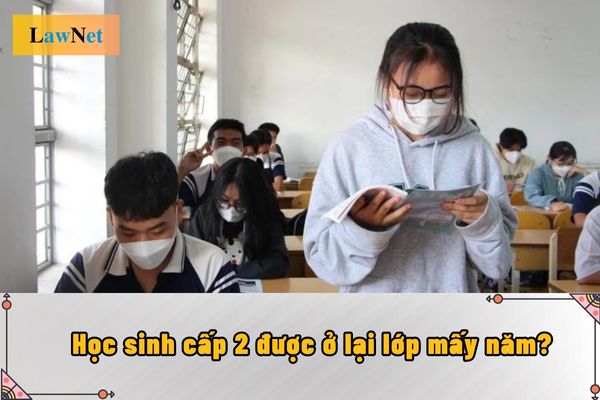How many times may a lower secondary school student repeat a grade in Vietnam?
How many times may a lower secondary school student repeat a grade in Vietnam?
Pursuant to Article 33 of the Charter for lower secondary school, upper secondary school and multi-level school, issued together with Circular 32/2020/TT-BGDDT, the regulations regarding the age of students at secondary schools are as follows:
Age of secondary school students
1. The age of students entering grade 6 is 11 years old. The age of students entering grade 10 is 15 years old. For students who have accelerated their studies in the previous level or students entering the education level at an older age than regulated, the age for entering grade 6 and grade 10 can be decreased or increased based on the age of graduation from the previous education level.
2. Students who are ethnic minorities, students with disabilities, students with special difficult circumstances, students returning from abroad can enter the education level at an age up to 03 years older than the regulated age.
3. Students cannot repeat a grade more than 03 times in one education level.
4. Students with good physical health and early intellectual development can start school at a younger age or skip grades within the education level. Consideration for each specific case is carried out as follows:
a) Parents or guardians submit a request to the school.
b) The principal establishes an assessment and advisory council including the following primary components: representatives of the school's leadership and the school's parent representative committee; the teacher of the class the student is attending.
c) Based on the assessment results of the council, the principal makes a decision.
5. Students within the regulated age range returning from abroad or children of foreigners working in Vietnam are allowed to study at secondary schools in their place of residence or secondary schools outside their place of residence if the school can accommodate them. Consideration for each specific case is carried out as follows:
a) Parents or guardians submit a request to the school.
b) The principal organizes an assessment of the student's level and places them in the appropriate class.
lower secondary school students cannot repeat a grade more than 03 times in one education level. The lower secondary school level (grades 6 to 9).
Thus, according to the above regulation, lower secondary school students can repeat a maximum of 3 years (3 academic years) within the entire education level.

How many times may a lower secondary school student repeat a grade in Vietnam? (Image from the Internet)
What behaviors are prohibited for lower secondary school students in Vietnam?
Pursuant to Article 37 of the Charter for lower secondary school, upper secondary school and multi-level school, issued together with Circular 32/2020/TT-BGDDT, the behaviors that are prohibited for lower secondary school students at secondary schools are as follows:
(1) Insulting the dignity and honor, infringing on the body of teachers, staff, other persons, and other students.
(2) Cheating in studying, exams, tests, and enrollment.
(3) Trading, using alcohol, beer, tobacco, drugs, other stimulants, fireworks, and incendiary or explosive materials.
(4) Using mobile phones, and other devices during class without authorization from the teacher and not for study purposes.
(5) Fighting, disturbing order, and security in the school and public places.
(6) Using or exchanging cultural products with violent or depraved content; using toys or playing games that are harmful to healthy development.
(7) Students are not allowed to commit other prohibited acts as stipulated by law.
What are the rights of lower secondary school students in Vietnam?
Pursuant to Article 35 of the Charter for lower secondary school, upper secondary school and multi-level school, issued together with Circular 32/2020/TT-BGDDT, the rights of students are stipulated as follows:
Right 1. To be treated equally in receiving comprehensive education, to be provided with conditions regarding time, physical facilities, hygiene, and safety for learning in class and self-study at home, to be provided with information regarding their study and training, to use equipment and facilities for learning, cultural, and sports activities of the school as regulated.
Right 2. To be respected and protected, to be treated equally and democratically, to have the right to complain to the school and educational management authorities about decisions concerning themselves; to transfer schools for legitimate reasons according to current regulations; to study ahead of age, skip grades, and study at an age higher than the regulated age according to Article 33 of the Charter for lower secondary school, upper secondary school and multi-level school, issued together with Circular 32/2020/TT-BGDDT.
Right 3. To participate in activities to develop their talents in subjects, sports, and arts organized by the school if they meet the conditions.
Right 4. To receive scholarships or other allowances according to regulations for students eligible for social policies, students with life difficulties, and students with special abilities.
Right 5. To transfer schools if qualified according to regulations; the procedures for transferring schools are carried out according to regulations by the Minister of Education and Training.
Right 6. To enjoy other rights as stipulated by law.

